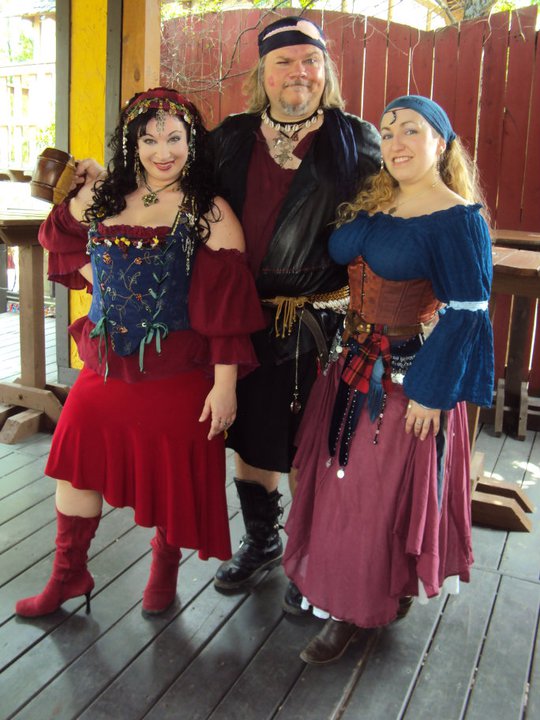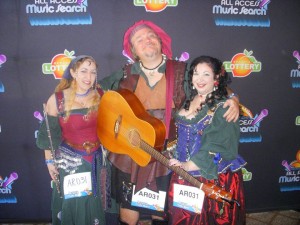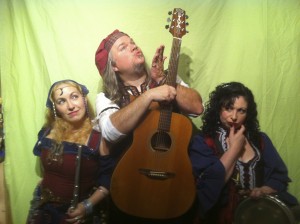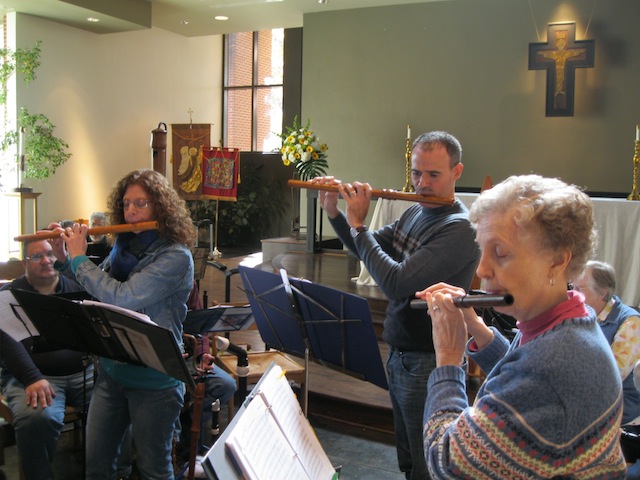
Joanne Mei plays the recorder and Darryl Payne the flute in Lauda Musicam of Atlanta.
Chances are, if most people have any impression of romantic music in Medieval, Renaissance and Baroque times, it’s either courtesy of a scruffy bard at the Georgia Renaissance Festival or an image of a troubadour standing beneath Juliet’s balcony – the Really Retro version of a mariachi band. However, like the serious and silly love songs of jazz, blues and rock, romantic music was much more diverse and delightful than these stereotypes suggest. Contemporary Romeos and Juliets will have a chance to find out for themselves when local early music ensemble, Lauda Musicam of Atlanta present “Love and Lust: A Valentine’s Day Concert,” this Sat. Feb. 11 at 8 p.m. at Holy Trinity Parish in Decatur.
ATLRetro caught up with Joanne Mei, who plays the recorder in Lauda Musicam; about the 50-member instrumental ensemble of recorders, viols, harpsichord, sackbuts, shawms, harps, crumhorns, cornettos, and percussion, as well as the history and sound of Medieval, Renaissance and Baroque music; and why this Saturday’s concert will be a Really Retro romantic night to remember.
Any thoughts on the love song in the Middle Ages and the Renaissance. Were love songs different in an era of arranged marriages and stark class divides? Would a troubadour have sung one of these songs under my balcony window?
The Renaissance was a very romantic time if you weren’t dying of plague. The Catholic Church had a huge influence over the period which led composers to find unusual ways to express themselves. At the time, marriage for the upper classes had little to do with love. Courtly love as interpreted by poets and troubadours emerged as a way for people to express their passion. If you were a medieval noblewoman, you may have had a troubadour singing your virtues. If you were a washer woman, forget about it.
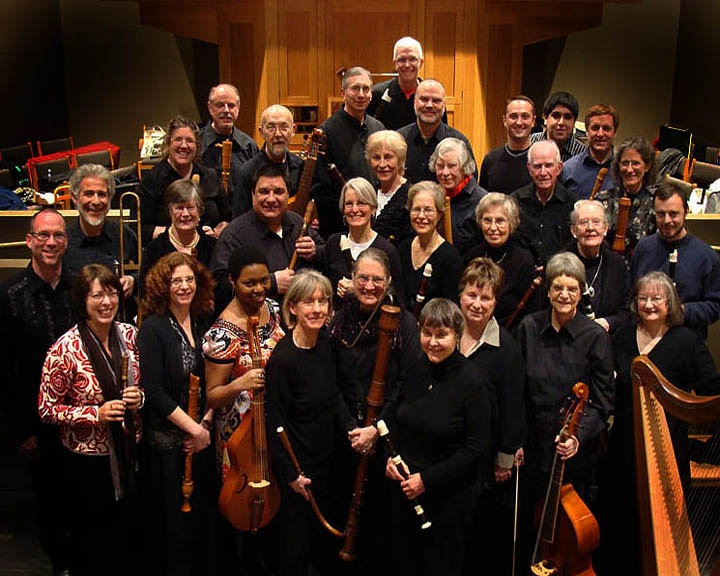
Lauda Musicam of Atlanta.
Tell us why we won’t be bored and why seeing this old music performed live in 2012 is both fun and enjoyable and the perfect way to spend date night with your 21st century Valentine.
If you have never heard early music, as performed on reproductions of period instruments, you are in for a real treat. Take your true love back in time for a unique, romantic evening with Lauda Musicam of Atlanta.
What does Lauda Musicam mean?
It is a Latin phrase that means “In praise of music.” Sometimes folks misspell it “Lauda Musicum,” which means “In praise of the musician.” We certainly intend the former!
For most folks, I’d guess that the three musical periods run together in our minds, but are there distinct difference between each like jazz, blues and rock n roll? Or were there different styles coexisting like today?
There were absolutely distinct styles and they were just as diverse as today. Unlike today, though, music wasn’t frequently heard in concerts. Rather, music served primarily a social function. Early musicians often refer to Medieval, Renaissance and Baroque as the three major style periods, but they overlap greatly, and each period is represented very differently from region to region.
Many instruments we consider standard today didn’t exist in those days, like the piano and the guitar. Are these older instruments harder to play or why did they drop out of fashion?
Early instruments are fairly easy to play, but it takes practice to play well. These instruments were eventually replaced by technology – keys and valves made playing louder, higher and faster more of a possibility.
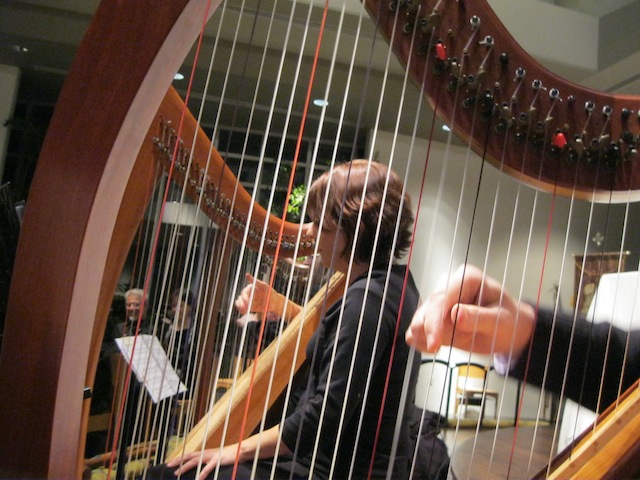
Liz Thomas plays the harp in Lauda Musicam.
Is there any story about how you become interested in/develop a love for medieval, Renaissance and baroque music, and joined Lauda Musicam?
After earning my PhD and getting a job, I found I had some time on my hands. One of my coworkers asked if I might like to try the recorder. Recorders are those plastic instruments you see in toy stores that so many grade school kids learn to play as their first instrument. I tried a soprano recorder in 1994 and got hooked!
Can you talk a little bit about the concert on Sat. Feb. 11? What will the group be performing?
LMA will be performing Love Music of the Renaissance at the Holy Trinity Parish in Decatur at 8 p.m. Performing with LMA will be Uncommon Practice, an a cappella group that sings vocal music before the 18th and 19th centuries. Countertenor Adrin Akins will provide his unique voice to selections while John Maschinot will perform traditional Celtic folk tunes on the bag pipes.
Has Lauda Musicam done any recordings? Or is one planned?
Our performances are usually recorded. The Lauda Musicam of Atlanta website is under construction but should have recordings available for download soon. Be our friend on Facebook!
What’s next for Lauda Musicam?
Our next two concerts will be geared to families and children. LMA will perform standard early music fare. Music by some of the most well-known composers will make this concert fun for the newbie and the enthusiast alike! Members will lead a “petting zoo” after the concert for people to see and try instruments and to ask questions.
Join us either on Sunday, May 6 at 3 p.m., at the Episcopal Church of the Good Shepherd, [in] Covington. Or Friday, May 18 at 8 p.m. at St. Bartholomew’s Episcopal Church at 1790 Lavista Road.
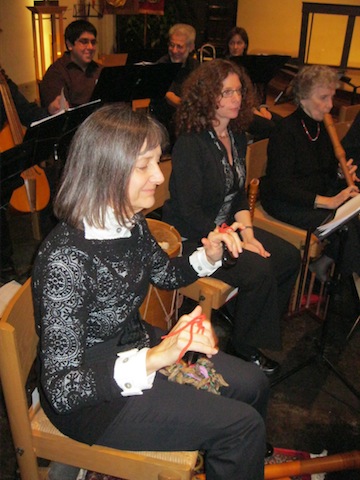
Robin Prechter, Joanne Mei and Patsy Woods of Lauda Musicam.
Are all Lauda Musicam’s concerts free?
You can listen to all the hits from the 5th to the 18th centuries for free, but donations are accepted and appreciated.
What’s your day job when you’re not playing with Lauda Musicam, and do you play with any other musical groups?
By day I manage a laboratory at CDC in Atlanta. I play recorders, Renaissance flute and the occasional percussion instrument. I also play penny whistles and sometimes perform Celtic rock music in pubs.
How do can someone become a member of Lauda Musicam of Atlanta?
Membership is open to amateur and pre-professional musicians with good music reading skills. Please contact [Lauda Musicam Director] Jody Miller at https://www.fippleflute.com/ or recorder96@aol.com.
Editor’s Note: Jody Miller also contributed some editing and checks for historical accuracy to this article. All photos courtesy of and copyright Lauda Musicam of Atlanta.

